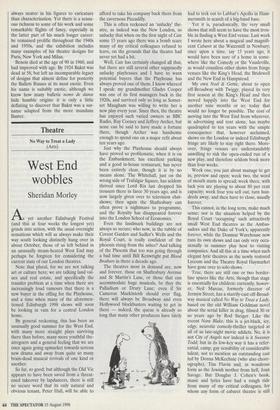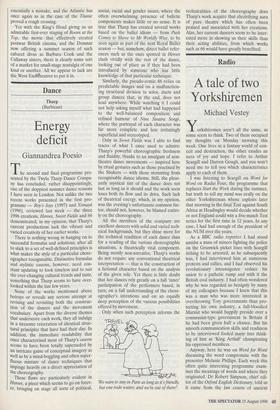Theatre
No Way to Treat a Lady (Arts)
West End wobbles
Sheridan Morley
Ayet another Edinburgh Festival (and this at four weeks the longest yet) grinds into action, with the usual overnight sensations which will as always make their way south looking distinctly hung over in about October, those of us left behind in an unusually steam-heated West End may perhaps be forgiven for considering the current state of our London theatres.
Note that plural, for we are not talking art or culture here; we are talking land val- ues and real estate, and specifically the transfer problem at a time when there are increasingly loud rumours that there is a new buyer in the offing for the Playhouse, and a time when many of the aforemen- tioned Edinburgh 1998 shows will soon be looking in vain for a central London home.
By general reckoning, this has been an unusually good summer for the West End, with many more straight plays surviving there than before, many more youthful the- atregoers and a general feeling that we are once again going upmarket towards serious new drama and away from quite so many brain-dead musical revivals of one kind or another.
So far, so good; but although the Old Vic appears to have been saved from a threat- ened takeover by lapdancers, there is still no secure word that its only natural and obvious tenant, Peter Hall, will be able to afford to take his company back there from the cavernous Piccadilly.
This is often reckoned an `unlucky' the- atre, as indeed was the New London, so unlucky that when on the first night of Cats some 15 years ago there was a bomb scare many of my critical colleagues refused to leave, on the grounds that the theatre had never yet had a hit.
Well, Cats has certainly changed all that, but there are still several other supposedly unlucky playhouses and I have to warn potential buyers that the Playhouse has always proved one of them. I know whereof I speak: my grandmother Gladys Cooper was one of its first managers back in the 1920s, and survived only so long as Somer- set Maugham was willing to write her a new play every year. Since then, the theatre has enjoyed such varied owners as BBC Radio, Ray Cooney and Jeffrey Archer, but none can be said to have made a fortune there, though Archer was handsome enough to spend one on a major refit about ten years ago.
Just why the Playhouse should always have proved so problematic, when it is on the Embankment, has excellent parking and a good in-house restaurant, has never been entirely clear, though it is by no means alone. The Whitehall, just on the wrong side of Trafalgar Square, has seldom thrived since Lord Rix last dropped his trousers there in farce 30 years ago, and is now largely given over to television chat- shows; then again the Shaftesbury can often prove a nightmare to programme, and the Royalty has disappeared forever into the London School of Economics.
Even the landmark buildings are not always so secure; who now, in the rubble of Covent Garden and Sadler's Wells and the Royal Court, is really confident of the phoenix rising from the ashes? And talking of the Phoenix that too was going through a bad time until Bill Kenwright put Blood Brothers in there a decade ago.
The theatres most in demand are, now and forever, those on Shaftesbury Avenue and St Martin's Lane, or those that can accommodate huge musicals, be they the Palladium or Drury Lane; even if Sir Cameron Mackintosh should ever flag, there will always be Broadway and even Hollywood blockbusters waiting to get in there — indeed, the queue is already so long that many other producers have lately had to trek out to Labbat's Apollo in Ham- mersmith in search of a big-band base.
Yet it is, paradoxically, the very small shows that still seem to have the most trou- ble in finding a West End venue. Last week I wrote here about a magical and magnifi- cent Cabaret at the Watermill in Newbury; once upon a time, say 15 years ago, it would have been sure of a home in some- where like the Comedy or the Vaudeville, as would countless other shows from fringe venues like the King's Head, the Bridewell and the New End in Hampstead.
My own Noel & Gertie, about to open off-Broadway with Twiggy, played its very first season at the King's Head and then moved happily into the West End for another nine months or so; today that would no longer be possible. The cost of moving into the West End from wherever, in advertising and rent alone, has maybe quadrupled in ten years with the simple consequence that, however acclaimed, shows on the London or indeed Edinburgh fringe are likely to stay right there. More- over, fringe venues are understandably unwilling to risk the open-ended run of a new play, and therefore seldom book more than four weeks.
Week one, you just about manage to get in, preview and open; week two, the word of mouth starts to spread; week three, with luck you are playing to about 80 per cent capacity; week four you sell out, turn hun- dreds away, and then have to close, usually forever.
This cannot, in the long term, make much sense; nor is the situation helped by the Royal Court 'occupying' such attractively small West End theatres as the Ambas- sadors and the Duke of York's, apparently forever, while the Donmar Warehouse now runs its own shows and can only very occa- sionally in summer play host to visiting companies. And all this at a time when such elegant lyric theatres as the newly restored Lyceum and the Theatre Royal Haymarket have gone over to solo shows.
True, there are still one or two border- line spaces like the Arts, though that stage is essentially for children; currently, howev- er, Neil Marcus, formerly director of Jermyn Street, has a starrily-cast off-Broad- way musical called No Way to Treat a Lady, based on the old William Goldman novel about the serial killer in drag, filmed 30 or so years ago by Rod Steiger. Like the recent Nora Blake, this is a jet-black, icy, edgy, neurotic comedy-thriller targeted at all of us late-night movie addicts. No, it is not City of Angels nor indeed is it Sweeney Todd; but in its low-key way it has a refer- ential, camp, gay sensibility of considerable talent, not to mention an outstanding cast led by Donna McKechnie (who also chore- ographs), Tim Flavin and, in wondrous form as the Jewish mother from hell, Joan Savage. But Douglas J. Cohen's book, music and lyrics have had a rough ride from many of my critical colleagues, for whom any form of cabaret theatre is still essentially a mistake, and the Atlantic has once again as in the case of the Titanic proved a rough crossing.
Yet with the King's Head giving us an admirable first-ever staging of Room at the Top, the movie that effectively created postwar British cinema, and the Donmar now offering a summer season of such cabaret divas as Barbara Cook and the Callaway sisters, there is clearly some sort of a market for small-stage nostalgia of one kind or another. All we appear to lack are the West EndiTheatres to put it in.



























































 Previous page
Previous page